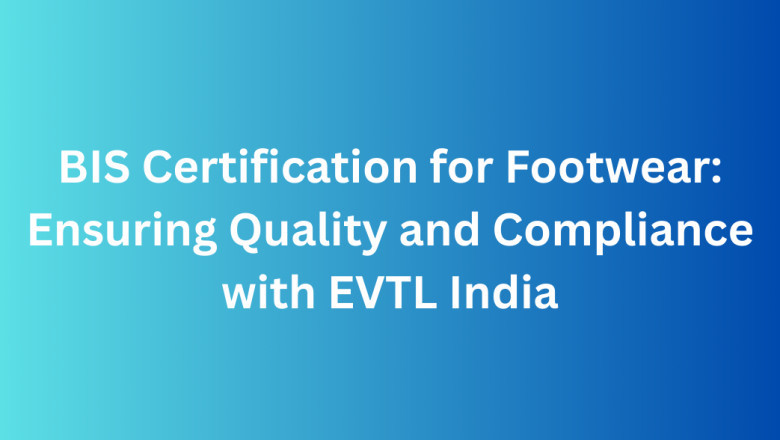views
Introduction to BIS Certification for Footwear
In recent years, consumer awareness around quality and safety standards in everyday products has grown significantly. One such essential product is footwear, which people rely on daily for protection, comfort, and mobility. To ensure that footwear sold in India meets stringent quality benchmarks, the Bureau of Indian Standards (BIS) has mandated the ISI Certification for Footwear under various Indian Standards. The ISI mark on footwear is now a symbol of trust, safety, and adherence to national regulations.
The footwear industry in India, encompassing a wide range of products from leather shoes to rubber sandals, must now align with these quality norms to legally sell their products in the Indian market. Both manufacturers and importers are required to obtain BIS Certification for Footwear to ensure compliance with government regulations and to cater to a quality-conscious consumer base.
Understanding ISI Mark for Footwear
The ISI Mark for Footwear indicates that a particular footwear product conforms to specific Indian Standards notified by BIS. These standards include various parameters such as material quality, durability, slip resistance, sole adhesion, and ergonomics. The ISI mark ensures that footwear is not only safe to use but also manufactured using processes that meet the prescribed quality norms.
Different types of footwear fall under different IS codes depending on the material used. For example, leather safety boots, sports shoes, and rubber chappals all have their respective Indian Standards. The ISI mark, prominently displayed on certified products, assures consumers of the product’s reliability and compliance with national safety norms.
Why ISI Certification for Footwear is Mandatory
The Government of India, through BIS, has made it mandatory for specific categories of footwear to be ISI certified. This move aims to prevent the sale of substandard and unsafe products in the market. The ISI Certification for Footwear helps in standardizing product quality across the industry, protecting consumer interests, and enhancing the reputation of Indian manufacturing.
For manufacturers and importers, obtaining ISI certification is not just a regulatory requirement—it also opens doors to increased consumer confidence and better market acceptance. Products without ISI certification may be restricted from sale and can attract penalties, leading to reputational and financial setbacks.
The BIS Certification Process for Footwear
The process of acquiring BIS certification for footwear involves several important steps. First, the manufacturer must submit an application to BIS, indicating the type of footwear and applicable IS standards. The manufacturing unit must have appropriate testing facilities and quality control measures in place as per BIS norms.
BIS officials will then conduct a thorough inspection of the production unit to verify the manufacturing process, infrastructure, and adherence to the standards. Samples from the batch are collected and tested in BIS-recognized laboratories to assess quality and safety parameters. If the product meets all the required criteria, the manufacturer is granted the ISI Certificate, allowing them to use the ISI mark on their products.
After obtaining the certification, manufacturers must comply with routine surveillance and testing to maintain the validity of their certification. BIS conducts periodic audits and inspections to ensure ongoing compliance with the relevant standards.
Common Challenges Faced by Manufacturers
Many footwear manufacturers, especially small and medium enterprises, find the BIS certification process complex and time-consuming. Understanding the exact standard applicable to a particular type of footwear, preparing technical documentation, and managing factory audits can be overwhelming for companies unfamiliar with regulatory procedures.
Mistakes in documentation, lack of awareness of the latest updates in BIS policies, or errors during sample testing can lead to delays or rejection of certification. For importers, the process becomes even more difficult as it involves coordinating with overseas manufacturers and ensuring that foreign production units meet Indian standards.
EVTL India: Trusted ISI Mark Consultant for Footwear
To simplify the process and ensure smooth certification, many manufacturers and importers rely on experienced consultants. EVTL India is one of the most reliable names in regulatory consultancy, offering comprehensive support for obtaining BIS Certification for Footwear and securing the ISI Mark.
EVTL India provides end-to-end assistance, including identifying the correct IS standards for the product, helping with application preparation, coordinating testing procedures, arranging factory inspections, and ensuring compliance throughout the process. Their expert consultants work closely with businesses to minimize delays, reduce errors, and achieve certification in a timely and cost-effective manner.
With deep industry knowledge and hands-on experience, EVTL India has successfully helped numerous footwear brands in India and abroad gain BIS certification and expand their market presence. Their commitment to client satisfaction and regulatory excellence makes them a preferred partner for ISI certification services.
Conclusion
The BIS Certification for Footwear is a critical requirement for manufacturers and importers aiming to succeed in the Indian market. The ISI mark not only guarantees compliance with national standards but also builds consumer confidence and enhances brand credibility. As government regulations continue to tighten, obtaining ISI certification is no longer optional but an essential step toward sustainable growth.
By partnering with a trusted ISI Mark Consultant like EVTL India, businesses can navigate the complexities of the certification process with ease. EVTL India's expertise, professionalism, and commitment to quality compliance ensure that your footwear products meet all regulatory requirements and are ready to make their mark in the competitive Indian market.














Comments
0 comment